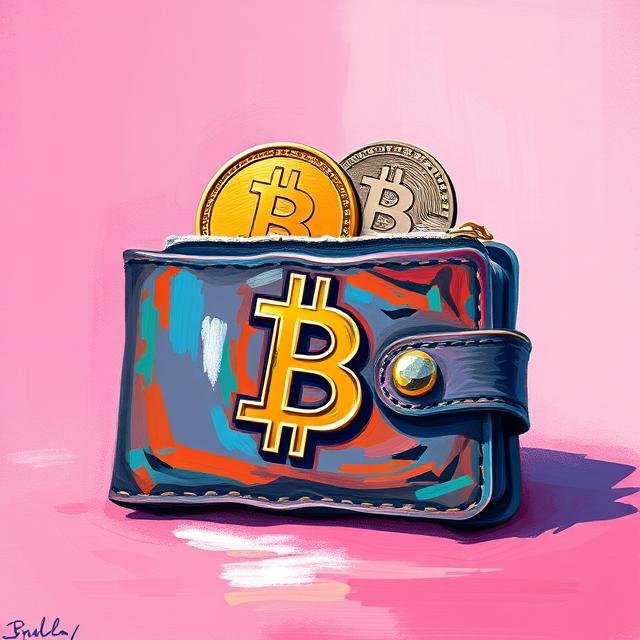So you’ve decided to take control of your crypto by moving it off an exchange and into your own wallet – that’s a fantastic security move! The next big question is: which type of software wallet should you use? The two most common options are a mobile crypto wallet and a desktop crypto wallet. While they share some similarities, they offer very different experiences in terms of convenience and security. This guide will break down the pros and cons of mobile vs desktop crypto wallets to help you choose the best fit for your needs in 2025.
- What Are Software Wallets? A Quick Primer
- The Mobile Crypto Wallet: Your Digital Assets in Your Pocket
- The Desktop Crypto Wallet: Your Command Center at Home
- Mobile vs Desktop Crypto Wallet: A Head-to-Head Comparison
- Quick Comparison Table: Mobile vs. Desktop Wallets
- Do You Have to Choose Just One? The Hybrid Approach
- Essential Security Practices for Any Software Wallet
- Final Thoughts: Choosing the Right Wallet for Your Needs
- FAQs: Your Mobile vs. Desktop Wallet Questions Answered
- References
What Are Software Wallets? A Quick Primer
Before we dive into the comparison, let’s clarify what we’re talking about. Both mobile and desktop wallets are types of “software wallets,” also known as “hot wallets.
- Software Wallet: A program or app that allows you to store, send, and receive digital assets.
- Hot Wallet: This means the wallet is on a device that connects to the internet, which is necessary for making transactions but also introduces potential security risks. Most software wallets are “non-custodial,” meaning you, and only you, have control over your private keys and the all-important seed phrase.
Why Your Choice Matters
Choosing between a mobile crypto wallet and a desktop crypto wallet will shape how you interact with your crypto. Your choice will depend on your priorities: do you value on-the-go access and convenience, or do you prefer enhanced security and a more feature-rich interface?
The Mobile Crypto Wallet: Your Digital Assets in Your Pocket
A mobile crypto wallet is an application you download and install on your smartphone. It’s designed for portability and ease of use, making your crypto accessible from anywhere.
Key Advantages of Using a Mobile Crypto Wallet
- Ultimate Convenience: The biggest pro is accessibility. You can send, receive, and manage your crypto on the go, anytime.
- On-the-Go Transactions: Perfect for in-person payments using QR codes or for making quick trades when you’re away from your computer.
- User-Friendly Interface: Most mobile wallets are designed with a clean, simple UI/UX, making them great for beginners.
- dApp and NFT Access: Many mobile wallets have built-in browsers that make it easy to connect to Decentralized Finance (DeFi) platforms and manage your NFTs.
Potential Disadvantages and Security Risks
- Higher Security Risk: Your phone is constantly connected to the internet and is a frequent target for malware, viruses, and phishing attacks via text or other apps.
- Risk of Physical Loss or Theft: If your phone is lost or stolen, an attacker could potentially gain access to your wallet if your phone’s security is weak.
- Smaller Screen Size: Can make complex tasks or detailed portfolio analysis more difficult compared to a desktop.
Best Use Cases for a Mobile Wallet
A mobile crypto wallet is ideal for:
- Storing smaller amounts of crypto that you use for frequent transactions.
- Quick, on-the-go payments.
- Beginners who want a simple and straightforward entry point into managing their own crypto.
- Interacting with DeFi and NFT platforms conveniently.
Popular Examples: Trust Wallet, Exodus (Mobile), Zengo, MetaMask (Mobile)
The Desktop Crypto Wallet: Your Command Center at Home
A desktop crypto wallet is a software program you download and install directly onto your laptop or desktop computer. It often serves as a more powerful, feature-rich “home base” for managing your digital assets.
Key Advantages of Using a Desktop Crypto Wallet
- Enhanced Security (Generally): Computers, especially desktops that are not carried around, can be secured more robustly than phones. They are less likely to be lost or stolen, and you can create a more controlled environment with dedicated security software.
- More Features and Control: Desktop interfaces often provide more detailed portfolio views, advanced transaction options, and more robust features than their mobile counterparts.
- Easier Integration with Hardware Wallets: Connecting and managing a hardware wallet (like a Ledger or Trezor) is often a smoother experience on a desktop computer.
- Easier and Safer Setup: It’s generally safer to handle sensitive information like your seed phrase on a larger screen in a private, controlled environment rather than on a small mobile screen in public.
Potential Disadvantages and Limitations
- Lack of Portability: You are tied to your computer. You can’t make quick transactions while you’re out and about unless you have your laptop with you.
- Vulnerability to Malware: Your computer is still connected to the internet and is susceptible to viruses, keyloggers, and other malware that could compromise your wallet if your computer’s security is breached.
Best Use Cases for a Desktop Wallet
A desktop crypto wallet is ideal for:
- Managing a larger or more diverse crypto portfolio from a secure home base.
- Users who do most of their crypto management and trading from one location.
- Staking or interacting with complex DeFi protocols where a larger screen is beneficial.
- Serving as the main interface for a hardware wallet.
Popular Examples: Exodus (Desktop), Electrum (Bitcoin-specific), Guarda, Atomic Wallet
Mobile vs Desktop Crypto Wallet: A Head-to-Head Comparison
Let’s break down the key differences to help you decide.
Security: The Most Important Factor
- Desktop wallets are generally considered to have a slight security edge over mobile wallets because computers are less likely to be lost or stolen, and it can be easier to create a secure, dedicated environment.
- Mobile wallets face risks from physical theft, SIM swap attacks, and potentially less secure public Wi-Fi networks.
- Winner (by a small margin): Desktop Wallet. However, a hardware wallet is superior to both for pure security.
Convenience and Accessibility
- Mobile wallets are the undisputed champions of convenience. The ability to manage funds and make transactions anywhere gives them a huge advantage for daily use.
- Desktop wallets are inherently less portable and convenient for on-the-go needs.
- Winner: Mobile Wallet.
Features and Functionality
- Desktop wallets often offer more advanced features, better portfolio overviews, and more detailed transaction controls due to the larger screen real estate and more powerful computing environment.
- Mobile wallets are typically streamlined for core functions, which is great for beginners but might feel limiting for power users.
- Winner: Desktop Wallet.
Quick Comparison Table: Mobile vs. Desktop Wallets
| Feature | Mobile Crypto Wallet | Desktop Crypto Wallet |
|---|---|---|
| Primary Advantage | Portability, On-the-go access | Enhanced security, More features |
| Best Use Case | Daily transactions, Quick dApp access | Portfolio management, Staking, Hardware wallet hub |
| Security Risk | Higher (theft of device, malware, public Wi-Fi) | Medium (malware, viruses on a connected PC) |
| Ease of Use | Generally very high, simple interface | High, but can be more complex with more features |
| Setup | Quick and easy | Straightforward, safer for handling seed phrase |
| Hardware Wallet Integration | Possible (often via QR codes or Bluetooth) | Often easier and more stable via USB |
Do You Have to Choose Just One? The Hybrid Approach
For many crypto users in 2025, the best solution isn’t choosing mobile or desktop – it’s using both strategically, often in conjunction with a hardware wallet.
- The Strategy:
- Keep the vast majority of your crypto (your “savings”) secure on a hardware wallet.
- Use a desktop wallet as your main command center to manage your portfolio and interact with your hardware wallet securely.
- Keep a small, “spending” amount of crypto on a mobile wallet for convenient, everyday use.
This approach gives you the best of all worlds: top-tier security for your main holdings and convenience for your active funds.
Essential Security Practices for Any Software Wallet
No matter which you choose, these wallet security practices are non-negotiable:
- Guard Your Seed Phrase: Write it down offline, store it in multiple secure locations, and never share it. This is your master key.
- Use Strong Passwords & Biometrics: Secure access to your device and the wallet app itself.
- Download from Official Sources Only: Double-check URLs and developer names before installing.
- Keep Your Software Updated: Always install updates for your wallet app and device operating system.
- Be Wary of Public Wi-Fi: Avoid making sensitive transactions on unsecured public networks.
Final Thoughts: Choosing the Right Wallet for Your Needs
In the mobile vs desktop crypto wallet debate, there’s no single “best” answer – only what’s best for you. If your priority is quick access and making transactions on the go, a mobile crypto wallet is an excellent choice. If you prefer a more feature-rich environment for managing your portfolio from a secure home base, a desktop crypto wallet is likely a better fit. For optimal security, consider using both in a tiered strategy with a hardware wallet as your primary vault. By understanding the pros and cons, you can confidently choose the right tools to manage your digital assets safely and effectively.
FAQs: Your Mobile vs. Desktop Wallet Questions Answered
Which is safer, a mobile or desktop crypto wallet?
Can I have the same crypto wallet on both my mobile and desktop?
If my phone is stolen, is my crypto gone from my mobile wallet?
Are desktop wallets immune to viruses?
As a beginner, should I start with a mobile or a desktop wallet?
References
- Ledger Academy. (n.d.). What Are the Different Types of Crypto Wallets?
Retrieved from https://www.ledger.com/academy/topics/crypto/types-of-crypto-wallets - Gemini Cryptopedia. (n.d.). Mobile and Desktop Crypto Wallets: How to Choose.
Retrieved from https://www.gemini.com/cryptopedia/crypto-wallets-mobile-desktop - CoinLedger. (2025). The 11 Best Cryptocurrency Wallets (June 2025).
Retrieved from https://coinledger.io/tools/best-crypto-wallet - Investopedia. (2025). Thinking of Investing in Bitcoin? Here’s How to Choose the Perfect Crypto Wallet.
Retrieved from https://www.investopedia.com/crypto-wallets-explained-choosing-the-right-wallet-for-your-first-bitcoin-11717157 - Exodus. (n.d.). Exodus: Crypto Wallet for Desktop & Mobile.
Retrieved from https://www.exodus.com/










